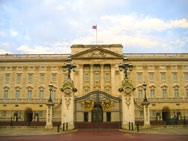The Man Behind the Microphone
By SARAH RICHARDSON
The King’s Speech opens with a close-up of an old fashioned microphone. The Duke of York stands outside, his wife gripping his arm, waiting silently. His eyes sweep over the words on the paper he clutches in his hand, his mouth forming words, yet no sound is produced. When the time comes, the radio operator says with an encouraging smile, “Let the microphone do the work.” The Duke walks into the arena where thousands of people wait to hear him speak, while millions more are waiting to listen through the microphone that stands in front of him. The Duke opens his mouth, but only stutters. The same pained expression that crawls across his wife’s face crosses my own as I hold my breath as he tries to find his words.
Colin Firth’s total transformation into Albert, the Duke of York, which recently won him a Golden Globe and an Oscar, is revealed through the story of a man trying to find his confidence while hindered by his favored older brother and a stutter that has haunted him since childhood. Every time Albert sees a microphone he looks terrified at the daunting apparatus knowing it feeds the anxiety he constantly feels. The Duke of York works with Lionel Logue, a speech therapist, played by Geoffrey Rush, who helps Albert not only work through the problems with his tongue, but the self-esteem issues that cause them. Their friendship grows as the possibility of Albert being crowned becomes a reality when his older brother falls for an American divorcee. Marrying a divorced woman would force his brother, Edward, to abdicate the thrown because divorce is not recognized by the Church of England; however, Albert doubts his ability to keep his subjects’ confidence because he doesn’t have any himself.
Firth had the challenge of playing someone who is not only a character in a story, but a historical figure. He had to learn to speak with a stutter to play a character who is learning to overcome his stutter, which is a challenge in itself. Firth deserved the Oscar for best actor after his performance in The King’s Speech, because his commitment to immerse himself in this role was much stronger than any of the other actors nominated for the award.
While Firth puts a great deal of care into his role, it is Rush’s character that steals the show with his pushy determination to help a man he barely knows. While Rush’s performance is good, it was the inspiring and witty screenplay that made him notable. His character was unafraid to cross any boundaries of rank leaving the audience nervously breathless with each liberty he took.
While the men in the movie deal with how to run the country, the women quietly deal with how to run the men. Helena Bonham Carter, who is known for her eccentric roles, takes on the role of Elizabeth, the Duke of York’s loving wife and excels. She was so unusually pleasant that I would have loved to have tea with her.
The scenes in which Albert gives a speech are paired with appropriate pieces of music. As he is improving on his speech, the music is loud and bouncy with slight mutes when he trips on a word. Just as in history, Albert addresses his subjects declaring England’s involvement in World War II. That particular speech is paired with solemn music, reflecting the message of the speech.
The cinematography is eye catching, especially the scenes taking place in Logue’s office. Albert stands in front of a wall, painted floor to ceiling with multiple colors swirling behind him, in a plain black suit, as he learns different techniques to overcome his stutter while the camera sweeps around the room behind him. The colors of the movie are muted except for in this office, but slowly become brighter as Albert’s speech improves.
The compassion and witty quips between the characters make this Thomas Hooper film the enjoyable uplifting story that it is. Though movies based on historical events cannot necessarily capture every moment exactly the way it happened, the King’s Speech captures the spirit of a man learning to become the King his war bound country needs. In a time when the movies that get the most recognition are about schizophrenic ballerinas and greedy twenty-something year olds, it’s nice to walk out of a theatre with a smile on your face and a few tears in your eyes.
